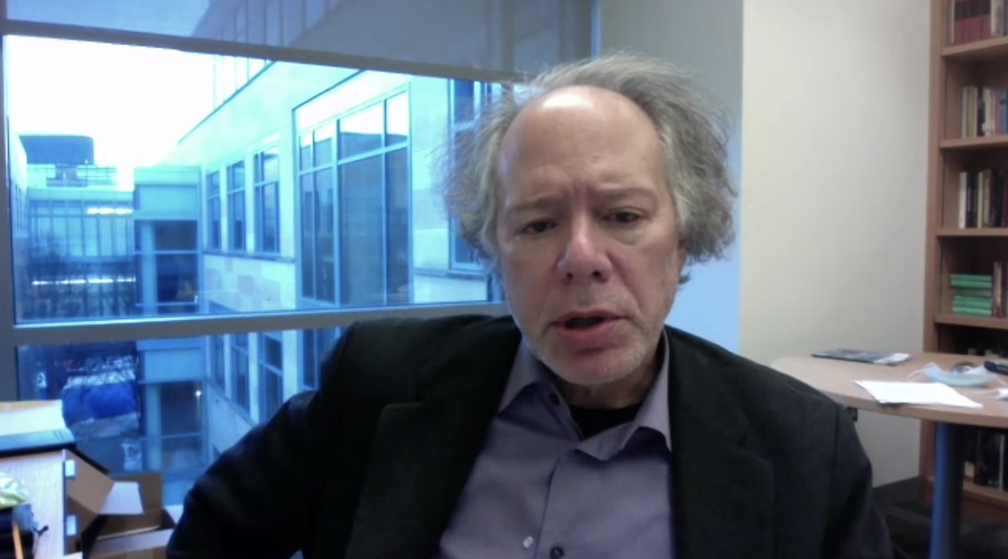Eisenhower Forum hosts Yale professor Steven B. Smith for virtual lecture on patriotism in modern times
March 4, 2022
 Ari Bersch
Ari BerschOn Monday afternoon, Steven B. Smith, Alfred Cowles Professor of Political Science and Professor of Philosophy at Yale University, gave a virtual lecture hosted by the Eisenhower Forum, a student discussion group that attempts to promote conservative political thought at Bowdoin. Smith, a scholar of political theory, spoke about his latest book, “Reclaiming Patriotism in an Age of Extremes,” as well as issues of patriotism and nationalism in today’s political environment.
Gabriel Ong ’23, the Eisenhower Forum’s communications director, has long been interested in Smith and his scholarship.
“His book, ‘Modernity and its Discontents,’ is one of the best things that I’ve read in the past few years,” Ong said. “[Smith] is also quite close with several of the faculty here and shares research interests…He’s a scholar of Hegel and Leo Strauss, and Professor Franco is also a scholar of Hegel and Leo Strauss. His interest in American political thought intersects with that of Professor Yarbrough.”
Beginning his talk, Smith asked, “In a country increasingly divided by geography, ethnicity, education, culture, even our understanding of facts, what is the source of national unity?”
He stated his belief that patriotism is at the heart of what holds America together, noting its roots in a common history shared by members of the nation.
“The idea that we share a common history held together by a collective memory is at the source of the disposition we call patriotism. Patriotism is an old—even ancient—disposition … Patriotism is above all a form of loyalty,” Smith said. “We admire loyalty to family, friends, sports teams, even institutions up to a point. Yet loyalty also sits uneasily with other qualities that we equally admire such as fairness, justice, mercy, equality and open mindedness.”
Smith expanded on this idea of loyalty and its impact on his actions towards others.
“I believe loyalty to country does not require me to be indifferent, much less hostile to the needs of others,” he said. “Partiality for my country does not lead me to indifference or hostility to others, except for times of war. Rarely do we find ourselves locked in a zero sum game where what’s good for one is bad for the other. There’s certainly nothing shameful about attending to our interests.”
Next, Smith raised a question about the connection between resistance and patriotism. He explained that the two have been intertwined since the foundation of the United States and that American political life requires resistance that is based in citizenship.
“More than any other country, America has made the right of resistance an intrinsic part of patriotism. Our country began with an act of resistance to the authority of the British crown, and the right of rebellion is enshrined in the Declaration of Independence,” Smith said. “Patriotic resistance at its best—the kind exhibited by Martin Luther King’s Letter from a Birmingham Jail—is the highest expression of political responsibility. It avoids moral grandstanding, and is closer to Socrates’ willingness to oppose an unjust law but also submit himself to its authority.”
During the discussion, Gary M. Pendy Sr. Professor of Social Sciences Jean Yarbrough asked Smith about the interaction of patriotic American values and modern political movements.
“America … is a free country with free institutions, a rule of law, a certain way of life,” Yarbrough said. “Is that really compatible with the redistributionist ethos of democratic socialism? Is it compatible with much more emphasis upon equality than liberty?”
Smith responded by emphasizing his belief in moral pluralism.
“I think it is a deep danger for anybody to put one single value … equality, in this case, as [a] trump card to which everything else must bend. I think this is what a lot of people on the redistributive left have done. They would use equality and achieving equality as the single moral goal for society,” Smith said. “I think that is not only wrong as a philosophical position, I think it’s incompatible with our constitutional framework, which includes a kind moral pluralism—freedom, liberty, equality, … tolerance, … room for self-improvement in the achievement of excellence, these are all competing goods, and decent politics is a way to balance between these.”
Bradford Dudley ’23, co-leader of the Eisenhower Forum, was satisfied with this response and Smith’s lecture as a whole.
“I really enjoyed his definition of patriotism, as sort of a means between nationalism—with all of its baggage—and a cosmopolitan idea,” he said. “Finding that positive outlook for one’s country, and especially then how when one disagrees with one’s country, how you can still be a patriot within the country system.”
Comments
Before submitting a comment, please review our comment policy. Some key points from the policy:
- No hate speech, profanity, disrespectful or threatening comments.
- No personal attacks on reporters.
- Comments must be under 200 words.
- You are strongly encouraged to use a real name or identifier ("Class of '92").
- Any comments made with an email address that does not belong to you will get removed.

I’d take conservatives more seriously if they spent their energy debating actual problems such as poverty, climate change or the realities of racism rather than offering platitudes about patriotism or attacking made-up caricatures of what “the left” is supposed to want. I’m also genuinely curious how Republicans reconcile their self-professed belief in the rule of law with their support of Donald Trump, whose contempt for the law and the US Constitution is proved beyond doubt.